When you are traveling abroad in Europe with a dietary restriction, it’s a good idea to be one step ahead of the game!
Here are a few tips to do just that:
- Dietary Restrictions on Your DIS Study Tour
Your dietary restrictions are taken from your initial student registration, and all meals on your Program Study Tour and/or Optional Study Tour are based on that information. If you have any questions about this, make sure to contact the DIS Study Tours Department at studytours@dis.dk. - Call Your Airline
Reserve special meals well in advance of your scheduled flight. Some airlines will require that you state your special meal preferences at the time of booking. If needed, call the airport in advance to see if you can purchase certain foods past security (for example, plain yogurt). - Consider Language Barriers
Think strategically on how you will communicate your dietary restrictions to restaurants when you are traveling to a new city. Bringing a note for the chef with some of the keywords in the local language, about your restriction, is a great way to make sure everyone is on the same page about your needs. You also might want to take advantage of products such as travel cards that translate your personal dietary restrictions into a variety of languages. Read more on selectwisely.com. - Travel with Back-Up Snacks
You can never really predict what you will find in local supermarkets. Plan to bring a few snacks – more than you think you will need – just in case! - Set Expectations
You will always be able to find safe food options, and if you do advance research your travels might even bring you to exciting and different meals. At the same time, don’t assume all meals will be new and different. Depending on where you travel, you may have to repeat some meals based on what is available - Be Flexible
In group travel situations, remain open to the situation. Even if the restaurants you visit agree to make special accommodations, you may need to supplement your meal to ensure you get enough to eat. Always have a back-up plan! - Do Your Research
If you know you’ll be in a certain city, check out local specialty stores or restaurants and consider making an order or reserving a table in advance. Sometimes, they will be able to cook something special for you. This could make a big difference for you in the long run! - Always Ask
If you are unsure of what is contained in a product or meal, ask first, as there may be hidden ingredients that could affect you.
